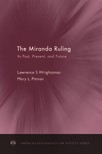 The Miranda Ruling: Its Past, Present, and Future
The Miranda Ruling: Its Past, Present, and Future
Published online:
01 May 2010
Published in print:
21 April 2010
Online ISBN:
9780199776986
Print ISBN:
9780199730902
Contents
-
-
-
-
-
-
-
Reactions to the Announcement of the Miranda Decision Reactions to the Announcement of the Miranda Decision
-
Three Stages Three Stages
-
The Dissents by the Justices The Dissents by the Justices
-
Empirical Findings Empirical Findings
-
-
The Realization of Miranda’s Ineffectiveness The Realization of Miranda’s Ineffectiveness
-
Limitations in the Original Decision Limitations in the Original Decision
-
Specific Limitations Specific Limitations
-
No requirement that Miranda rights be given immediately No requirement that Miranda rights be given immediately
-
No retroactive application No retroactive application
-
Limited to “in-custody” interrogations Limited to “in-custody” interrogations
-
A loss of morale and a sense of confusion in the police A loss of morale and a sense of confusion in the police
-
-
-
-
-
-
-
-
-
Chapter
4 Limitations of the Original Opinion
Get access
Pages
61–76
-
Published:April 2010
Cite
Wrightsman, Lawrence S., and Mary L. Pitman, 'Limitations of the Original Opinion', The Miranda Ruling: Its Past, Present, and Future, American Psychology-Law Society Series (New York , 2010; online edn, Oxford Academic, 1 May 2010), https://doi.org/10.1093/acprof:oso/9780199730902.003.004, accessed 16 May 2025.
Abstract
This is the first of four chapters describing different causes for the less-than-anticipated impact of the Miranda decision. The decision was a compromise, and did not go as far as it could have. For example, the justices considered, but rejected, a requirement of an attorney’s presence when the warnings were given. The decision limited the application of the warnings to only those interrogations when the defendant was “in custody,” and the Court was vague about the timing requirements.
You do not currently have access to this chapter.
Sign in
Personal account
- Sign in with email/username & password
- Get email alerts
- Save searches
- Purchase content
- Activate your purchase/trial code
- Add your ORCID iD
Purchase
Our books are available by subscription or purchase to libraries and institutions.
Purchasing informationMetrics
View Metrics
Metrics
Total Views
55
49
Pageviews
6
PDF Downloads
Since 10/1/2022
| Month: | Total Views: |
|---|---|
| October 2022 | 1 |
| December 2022 | 1 |
| January 2023 | 1 |
| February 2023 | 7 |
| March 2023 | 19 |
| April 2023 | 13 |
| November 2023 | 3 |
| December 2023 | 1 |
| June 2024 | 2 |
| August 2024 | 2 |
| November 2024 | 5 |
Citations
More from Oxford Academic
Get help with access
Institutional access
Access to content on Oxford Academic is often provided through institutional subscriptions and purchases. If you are a member of an institution with an active account, you may be able to access content in one of the following ways:
IP based access
Typically, access is provided across an institutional network to a range of IP addresses. This authentication occurs automatically, and it is not possible to sign out of an IP authenticated account.
Sign in through your institution
Choose this option to get remote access when outside your institution. Shibboleth/Open Athens technology is used to provide single sign-on between your institution’s website and Oxford Academic.
If your institution is not listed or you cannot sign in to your institution’s website, please contact your librarian or administrator.
Sign in with a library card
Enter your library card number to sign in. If you cannot sign in, please contact your librarian.
Society Members
Society member access to a journal is achieved in one of the following ways:
Sign in through society site
Many societies offer single sign-on between the society website and Oxford Academic. If you see ‘Sign in through society site’ in the sign in pane within a journal:
If you do not have a society account or have forgotten your username or password, please contact your society.
Sign in using a personal account
Some societies use Oxford Academic personal accounts to provide access to their members. See below.
Personal account
A personal account can be used to get email alerts, save searches, purchase content, and activate subscriptions.
Some societies use Oxford Academic personal accounts to provide access to their members.
Viewing your signed in accounts
Click the account icon in the top right to:
Signed in but can't access content
Oxford Academic is home to a wide variety of products. The institutional subscription may not cover the content that you are trying to access. If you believe you should have access to that content, please contact your librarian.
Institutional account management
For librarians and administrators, your personal account also provides access to institutional account management. Here you will find options to view and activate subscriptions, manage institutional settings and access options, access usage statistics, and more.